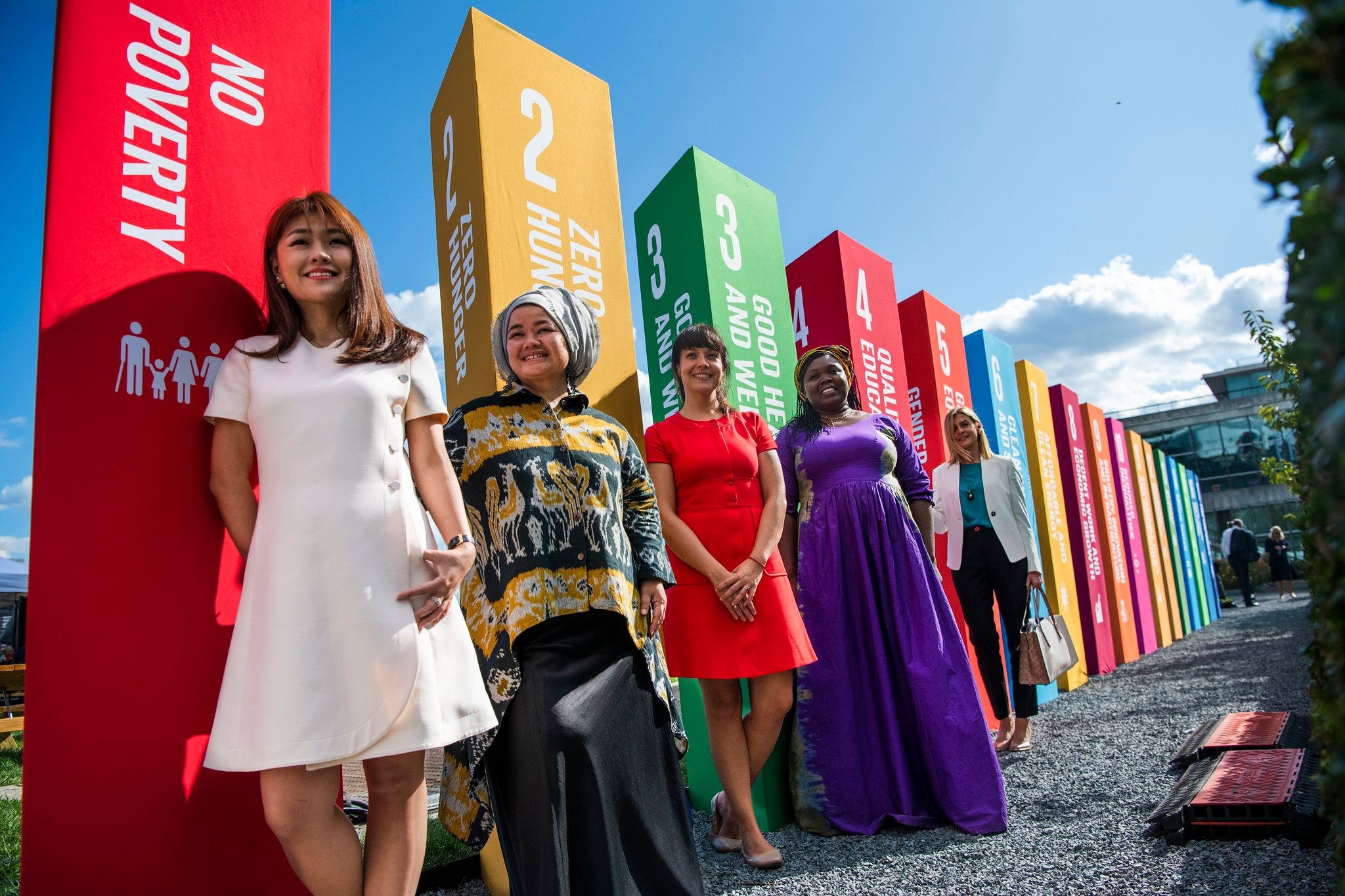Team Agritech wins with its ozone-based disinfection system to address disaster preparedness and advance human welfare
Columbia University School of Professional Studies (SPS) and UNICC have collaborated to bring students and alumni together to advance human welfare, accelerate the UN’s Sustainable Development Goals and confront the great challenges of our time in the first-ever Columbia University SPS – UNICC Thinkathon. Teams proposed solutions to three social challenges:
- Gender equality: Using data and technology to address violence against women during and beyond COVID-19
- Cybersecurity: Understanding risks that arise from our reliance on the Internet, focusing on regulatory, policymaking and/or technological solutions in areas of Artificial Intelligence, personal data, automatic decision making and victims of data breaches
- Disaster preparedness: Reporting on the manner in which COVID-19 has impacted vulnerable populations, to inform solutions and strategic planning to recover and reverse deterioration trends.
A summer-long Thinkathon to advance human welfare
Seven teams have been working all summer on real-world solutions with live data, mentored by subject matter area experts from Columbia, the private sector and UN Agencies.
In June, 17 teams of 3 to 5 people submitted their proposals with a statement of interest, with answers to one of the three challenge prompts and optional supporting documents. Among the initial participants there were 45 Columbia University students or alumni from five different schools, with 38 external students or professionals. Up to ten countries on four continents were represented.

A review committee studied the submissions and selected seven final teams that moved forward to the Thinkathon competition. These teams have been working throughout July and August together with expert university, private sector and UN mentors to refine their proposals and final presentations.
Three of the teams selected the Gender Equality challenge, two teams worked on the topic of Disaster Preparedness and the last two teams chose the Cybersecurity challenge. Mentors who provided guidance and support included:
- Edna Chun, Lecturer, Human Capital Management Department, Columbia University
- Shouryadipta Sarkar, Information Management Senior Specialist, UNDP
- Shahryar Shaghaghi, Chief Technology Officer, Quantum Xchange
- Tima Soni, Chief, Cybersecurity Section, UNICC
- Lizzette Soria, Women’s Policy Expert, Safe Cities, UN
- Jay Kesavan, Data Science Expert and Partner, Bowery Software.
Final presentation and winners
On 24 August 2021, finalist teams had the opportunity to present their ideas in front of a global audience and a panel of preeminent judges, in a live event that featured initial remarks by Columbia University SPS Senior Associate Dean of Student Affairs Zelon Crawford and presentations from UNICC’s Chief of Data and Analytics Anusha Dandapani and Data Scientist Dishti Gurnani.
Then each team had five minutes for their final pitch, after an introduction by their mentors. The judges had the opportunity to ask follow-up questions. After long deliberation, UNICC’s Chief of Data Analytics Anusha Dandapani announced the winners.
Team Agritech was the first-place winner, receiving a $3,000 cash prize, with its solution of a newly-developed, sustainable, proprietary ozone-based disinfection delivery system to tackle the disaster preparedness challenge. The system addresses the matter of food loss and food safety by dramatically minimising the effect of malicious pathogens on agricultural products across the entire supply chain, while at the same time considerably increasing shelf life of fresh fruits and vegetables as well as seafood, meats and edibles greens.
Our unique ozone delivery system is designed extensively to be applied in the form of dry or wet methods determined by sensitivity, delicateness, fertility of the treated products.
Agritech Team
Logista Emergency Response was the runner-up. Their solution addressed the Disaster Preparedness challenge with a rapidly deployable and scalable field-based logistics system that gives emergency responders accurate, data-driven insights in order to make the right choices when time and resources are in demand. The cash prize for the runner-up team was $2,000.
The audience-chosen team was The Bulb, which was awarded a $1,000 cash prize for their Gender Equality solution of virtual networking against violence. The team proposed a virtual networking solution to eliminate all forms of discrimination and violence against women. Their solution contains two major networking platforms, a group chat using a popular communications app and a blog site.
The teams were evaluated for their clarity and innovation, the social impact of their solutions, the capital requirements and financial forecast, the viability, both operational and technical, feasibility and sustainability of the solution, as well as the presentation delivery. The panel included the following judges:
- Pavan Pidugu, Chief Technology Officer, Federal Motor Carrier Safety Administration, U.S. Department of Transportation
- Rodrigo Hernan Prado Cordova, Co-Founder and Managing Partner of Primus AI, RPA
- Reda Sadki, President, The Geneva Learning Foundation
- Ursula Wynhoven, United Nations Representative, International Telecommunications Union
- Friederike Schüür, Fellow, AI Ethics and Digital Governance, United Nations.
Solutions proposed by other teams were also great:
- The SafeTeal team proposed an inter-sectional mobile app for gender-based violence prevention and response. The app is intended to engage across the educational space, advocacy circles and the healing space.
- The Merakhi team also had a solution to the Gender Equality challenge, proposing a smart jewelry and education program.
- The CV2 team proposed a global, encrypted communications platform to tackle one of the biggest challenges in the cybersecurity space, by collecting and dispersing information in a timely and secure manner
- The World ID team proposed a distributed ledger Software-as-a-Service (SaaS) providing digital identity solutions designed to immutably protect sovereign, institutional, and citizen-level data and information, increasing scale and integrity in global information systems.
Thanks to this Thinkathon to advance human welfare, participants have been able to sharpen their critical thinking, problem-solving and communication skills. The challenges have heightened their awareness of global challenges, allowing them to build capacity and share knowledge, and work in collaboration with people with different perspectives.

